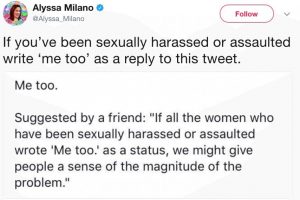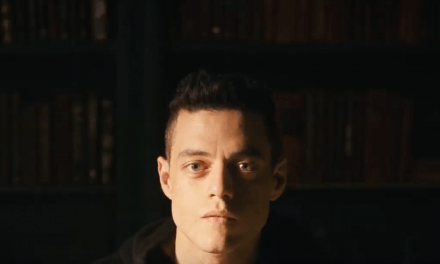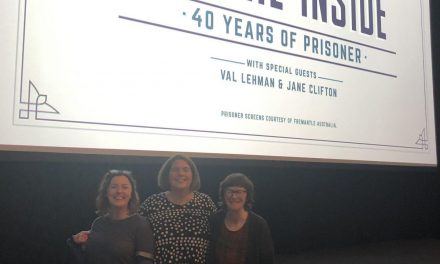I thought this week would be a good week to finally talk about Charmed (The WB, 1998-2006, The CW, since 2018). It was Halloween, and part of my rituals of the day include watching the third season episode ‘All Halliwell’s Eve’ which imagines Halloween as ‘the witches’ holiday’, i.e. the day of the year when women’s power is celebrated. The episode has some brilliant moments, including when Phoebe complains about the representation of witches in popular culture (here presented as the stereotype of the old hag on a broomstick), only to be told by her older sister Prue that she is impressed by her ability to make a protest statement with her dress and at the same time show cleavage. Then there’s the moment when Phoebe ‘embraces the cliché’ in order to scare away the men that are shooting at them:
Overall, the time-travelling narrative of the contemporary witches finding themselves in 17th century Virginia is a thinly veiled allegory for the relationship between different generations of feminists which thematises the sense of disappointment sometimes expressed by second generation feminists with those from the third generation, and the sense that ‘knowledge has been lost’ as a result of the fact that women’s narratives and stories are constantly being marginalised or re-formulated in ways that make women fit into the patriarchal order as either powerless or evil (interesting opposition that). The episode is then a particularly good example, perhaps, of the feminist undertones of the series as a whole which it was pretty amazing to encounter, in the post-Backlash days of the 1990s, as a (relatively) young woman living in a country where she was actively discouraged from pursuing an academic career because of… erm… her gender.
 I was therefore excited when I heard that the much-discussed reboot was finally happening. Of course, I read all about how Shannen Doherty thought it was a bad idea and how the rest of the cast weren’t massively behind the project either. Whilst I have a lot of respect for them, and in particular Alyssa Milano because of her engagement in the #MeToo movement and her work on the Equal Rights Amendment, I felt too strongly that a reboot might give a new generation of women access to narratives that celebrate women’s power to share their concerns. Times have changed, of course, and we are in the middle of a new wave of activism that pushes back against a new backlash. This means that the reboot is a very different beast from the original: we have in the three sisters a brilliant scientist, a radical feminist and a(n as yet uncomfortable) sorority girl who, although the youngest, is emotionally and socially sometimes the most mature. It also looks completely different, of course, and is much more overtly feminist (note the direct reference to ‘All Halliwell’s Eve’):
I was therefore excited when I heard that the much-discussed reboot was finally happening. Of course, I read all about how Shannen Doherty thought it was a bad idea and how the rest of the cast weren’t massively behind the project either. Whilst I have a lot of respect for them, and in particular Alyssa Milano because of her engagement in the #MeToo movement and her work on the Equal Rights Amendment, I felt too strongly that a reboot might give a new generation of women access to narratives that celebrate women’s power to share their concerns. Times have changed, of course, and we are in the middle of a new wave of activism that pushes back against a new backlash. This means that the reboot is a very different beast from the original: we have in the three sisters a brilliant scientist, a radical feminist and a(n as yet uncomfortable) sorority girl who, although the youngest, is emotionally and socially sometimes the most mature. It also looks completely different, of course, and is much more overtly feminist (note the direct reference to ‘All Halliwell’s Eve’):
https://youtube.com/watch?v=-ycEPoT1Nzw
It is perhaps unsurprising that a more overtly feminist rendition of the story would then be met with quite a lot of criticism. What I want to do for the rest of this blog is dissect this criticism a bit in order to understand how much of this is connected to discourses that continue to undermine narratives of women’s power.
One central discourse – which feminists know all too well of course – is that the show takes itself too seriously and is no more fun. Laura Bradley of Vanity Fair, for example, compares the reboot to the original Charmed and comes to the conclusion that ‘it’s tough to know how seriously the CW version takes itself, and that’s a question it should answer since the original Charmed worked largely because it was so unabashedly cheesy’. The praise for the 1998 version could hardly be less flattering if it tried to – calling a feminist show good because it was essentially bad, but knowingly so, suggests a continuation of discourses that value feminist narratives only if they occupy the silos that can, perhaps, be claimed as cult, but stay away from the mainstream. Interestingly, this is quite a re-interpretation of things: I remember distinctly the conversations I had with peers at university about the low cultural status of the programme (particularly in comparison to Buffy) because it was too mainstream, too safe and too much aimed at women who, of course, remain the imagined audience for ‘lowest common denominator’ programmes of the networks, including the soaps. Importantly, though, calling the original ‘cheesy’ now and criticising the contemporary version for its lack of cheesiness feeds into a discourse that emphasises that stories about women’s power need to be fun in order to be acceptable as television entertainment. No one made this clearer than Judy Berman in her review for Time Magazine, which is even entitled ‘The CW’s Charmed Reboot is so Political, It forgot to be Fun’. The open politics of the series is however central to the nucleus of the show, suggesting that at least part of the reviewing establishment in America continues to believe that television drama is not a place to address directly larger political issues, particularly when the personal becomes political, rather than the other way round: where a story that involves politics eventually shifts the focus and comes to a solution by turning to the personal.
The other criticism levelled at the programme is that it tries too hard to fit in with the group of people it aims to attract – young women who understand and use slang such as ‘woke’ or ‘DM me’ and who are ‘woke’, i.e. aware of issues of sexual politics. What strikes me is that here the discourse is focused on timelessness and universality as central values. However, that misunderstands that language is constantly changing and that the issue of sexual politics has been around for quite some time. Although the conversations we are having now are specific in that they are embedded in a cultural moment, I, for one, encountered ideas of sexual consent as a result of meeting second generation feminists, and not because of #MeToo which obviously managed to bring this issue into the forefront of the social media age. But it also makes me wonder if that demand for timelessness and universality is not also a different means to value the a-political, particularly when the political is presented as something worth fighting for rather than the battleground on which to fight.[1] Taken in this light, the devaluation of the engagement with the current climate is also nicely fitting into a shift towards the “politics without politics” where democracy is conflated with neoliberal values of freedom and choice for the individual.
What becomes apparent then, is that the critical discourses around the Charmed Reboot perfectly fit the Zeitgeist, just that they are closer to the currently governing powers than they might want to be: they suggest an embrace of neoliberal values of depoliticization combined with a continued discomfort with women’s power. What this analysis, then, might point to is that Trump’s rise to power and the confirmation of Brett Kavanaugh as supreme judge are perhaps not quite as much coming out of the blue and due to Trump’s star power as the reviewers and their like might think. Rather, Trump’s and his cronies’ power sits in the same underlying ideologies of neoliberalism and misogyny visible in these reviews that structure so much of the value system that dominates American public life today.
Elke Weissmann is Reader in Film and Television at Edge Hill University. She is currently considering changing this to Reader in Television and Film, however. Her books include Transnational Television Drama (Palgrave) and the edited collection Renewing Feminisms (I.B.Tauris) with Helen Thornham. She sits on the board of editors for Critical Studies in Television. She migrated to the UK in 2002 after realising that German television was as bad as she remembered.
Footnotes:
[1] Joe Conway (2016) provides an interesting analysis of how programmes providing political satire critique 24/7 news for their depoliticization of politics: here, politics becomes about the person and the revelation of character rather than the politics.





